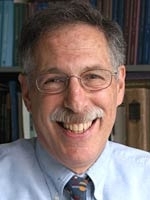Dr. Peter A. Diamond, one of the world's leading economists, is an Institute Professor at the Massachusetts Institute of Technology.
Professor Diamond, 63, is best known for his pioneering work in optimal taxation. Optimal taxation has been widely applied to the pricing of public utilities. His macroeconomic model with overlapping generations has been very widely used.
In June, 1997, Professor Diamond was named an Institute Professor, the highest honor the MIT faculty can bestow upon a colleague. MIT President Charles Vest summarized Professor Diamond's achievements then, saying, "As one of the world's most distinguished economic theorists, you have enhanced our understanding of modern public finance, the role of search processes in the macroeconomy, the functioning of financial markets and the significance of fiscal policy in a growing economy. You have the respect of theorists and practitioners alike and have brought clarity and rigor to the debate over the future of Social Security in this country."
In 1998, Professor Diamond was named co-chair of a panel convened by the National Academy of Social Insurance to study proposals to privatize Social Security. He served on the Senate Finance Committee's Panel on Social Security Financing in the mid-1970s and on panels of technical experts consulting to the President's Advisory Councils on Social Security.
Professor Diamond's earliest work, published in the 1960s, analyzed the long-term effects of the growing national debt on the behavior of the economy. His second major publication (together with James Mirrlees) revolutionized the analysis of commodity taxes to combine issues of income distribution along with economic efficiency. Later research on prosperity and recession emphasized how the actions of each producer "spill over" and enlarge (or shrink) the market for other goods.
Professor Diamond is the author of "A Search Equilibrium Approach to the Micro Foundations of Macro-economics" (MIT Press), "On Time" (Cambridge University Press), "Social Security Reform" (Oxford University Press), "Taxation, Incomplete Markets and Social Security" (MIT Press) and the forthcoming "Saving Social Security: A Balanced Approach" (with Peter R. Orszag, Brookings Institution). He is the editor (with M. Rothschild) of "Uncertainty in Economics: Readings and Exercises" (Academic Press); "Growth/Productivity/Unemployment" (MIT Press); and co-editor of "Social Security: What Role for the Future?" (Brookings Institution). He is the author of many articles and is formerly co-editor of the Journal of Public Economics.
Among Professor Diamond's many honors are the Erwin Plein Nemmers Prize in Economics from Northwestern University, for which he was the inaugural winner in 1994. That award recognized his work for opening "new and exciting fields of research, setting both a standard and a direction for other economists." In giving the award, Northwestern University President Arnold R. Weber said, "Few economists write an article that opens up a whole new field of analysis for other economists. Peter Diamond has done so not only once but three times in his career."
He has been a research associate of the National Bureau of Economic Research since 1991. He was the recipient of a John Simon Guggenheim Memorial Fellowship in 1966 and again in 1982-83. He won the Mahalanobis Prize in 1980. Professor Diamond was a founding member of the National Academy of Social Insurance in 1988 and was elected to membership in the National Academy of Sciences in 1984. He was elected as a fellow of the American Academy of Arts and Sciences in 1978 and a fellow of the Econometric Society in 1968.
He is currently President of the American Economic Association and has been president of both the Econometric Society and the National Academy of Social Insurance.
Professor Diamond was born on April 29, 1940. He received the B.A. degree in mathematics summa cum laude from Yale University in 1960, and the Ph.D. degree in economics from MIT in 1963. He began his teaching career as an assistant professor of economics at the University of California at Berkeley in 1963 and was there until 1966, when he joined the MIT faculty as an associate professor. He was promoted to professor in 1970. He was head of the MIT economics department from 1985-86, held the John and Jennie S. MacDonald Professor of Economics chair from 1989-91, and in 1991 he was selected to hold the first Paul Samuelson Professorship in Economics.
Professor Diamond has held visiting appointments at Churchill College, Cambridge (1965-66); the University College, Nairobi (1968-69); Hebrew University, Jerusalem (1969); Nuffield College, Oxford (1969); Balliol College, Oxford (1973-74); Harvard University (1977-78) and University of Siena.
Professor Diamond lives in Lexington, Mass. with his wife. He has two sons.






